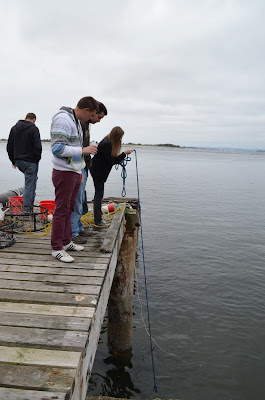Not all class days can or should be 15+ hours long. So today was a bit lighter.
The word for the day is “plankton”. Plankton are little creatures so small or
weak that they cannot overcome currents.
If you recall, at the end of Day 3 we collected 100s of larval
crabs.
Megalops stage of Dungeness crabs Cancer/Metacarinus magister
(c) 2013 Alan Holyoak
The first order of the day today
was to take a close look at those crab larvae and the juvenile crabs they
metamorphose into…and there was a lot of metamorphosis going on. This was a prime opportunity for the class to
see things that few people ever see firsthand.
So with scopes on the lab benches and pencils at the ready, they dove
into looking, drawing, and thinking about crabs.
RL: Elysa and Mackenzie
Tony
Blake and Kristin
LR: Jessica, Bailey, Daniel, Dallas
Our teaching lab at OIMB
During the middle of this session Craig Young, Director of
OIMB, popped in to see if we were here and how we were doing. I’ve known Craig for, yikes, close to 30
years. He has been inviting me to come
to OIMB for the past several years. I’m
so glad that we finally made it. Anyway…
After about an hour with the crabs it was time to move onto
lecture material for the day. We spent
about the next 1.5 hours going over structure and processes of plankton
communities including everything from marine viruses and bacteria to large
plankton like krill and jellyfishes.
With a good dose of theory in our bellies we needed a break,
so we went on plankton safari to the Charleston, OR, marina, and with plankton
net and dip buckets in hand we were off.
Unfortunately there were no jellies to be seen, so we had to
rely on the plankton net for samples.
That’s OK, and we finished collecting samples just in time for
lunch.
Off to the Charleston, OR, harbor
Tony does a plankton tow.
The crew takes a look at life on the docks
After lunch we finished our lecture material for the day and
walked down to the pier by the Boat House at OIMB to collect more plankton, we
hoped. Then it was time to go back to
the lab. Students pulled out the scopes
and got to work seeing what they could see.
They say larval worms, snails, crabs, copepods, and barnacles, along
with diatoms and other things. It’s
always an adventure to see what tiny creatures abound in a drop of water.
Off to the OIMB Boat House pier to do more plankton tows.
Lindsey take a turn collecting samples. Blake and Tony look on.
That work went right up until dinner…and we had a short
meeting to discuss the next few days.
We had a short group meeting at 7p to discuss the next few
days. There’s good news and there’s bad
news. The good news is that we will have
negative low tides for the next several days.
The bad news is that tomorrow the low tide is at 6am. Heh heh.
We plan to leave at 5:45 am to work this low tide.
By the way, the crew decided to head back to the harbor tonight to see if the megalops crab larvae are still there. They might be a very nice little research organism for a team or two to work on.
By the way, the crew decided to head back to the harbor tonight to see if the megalops crab larvae are still there. They might be a very nice little research organism for a team or two to work on.
Oh well, if students wanted to sleep they
could have stayed in Rexburg, because when the tide’s low we go!











No comments:
Post a Comment